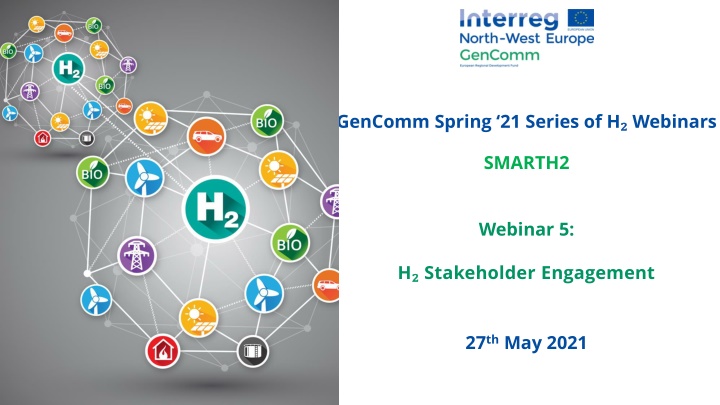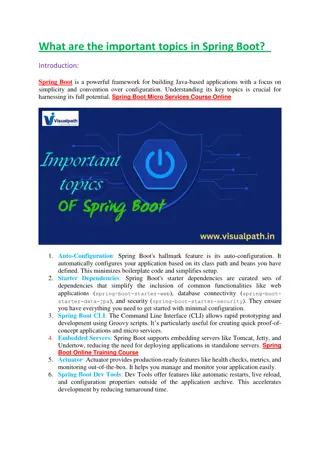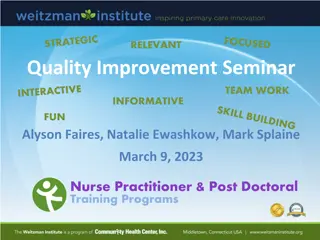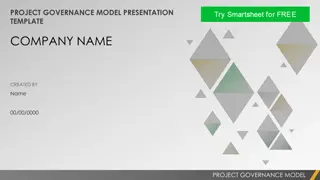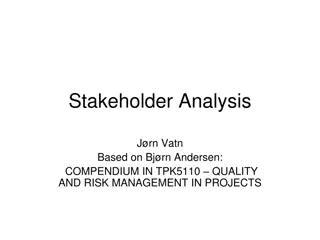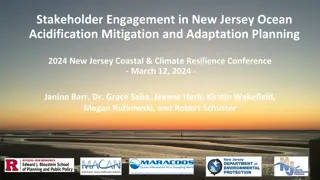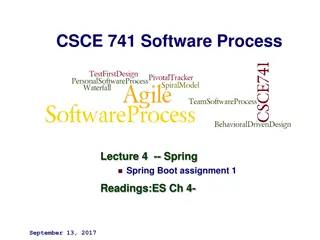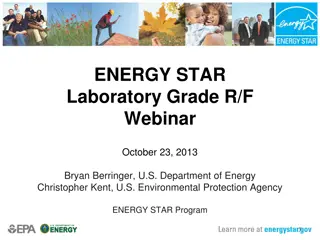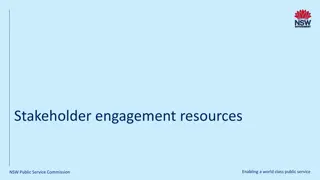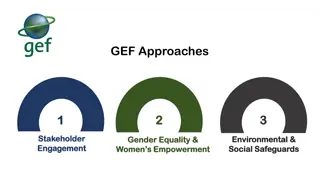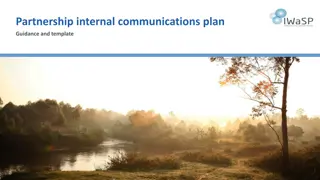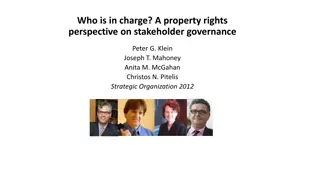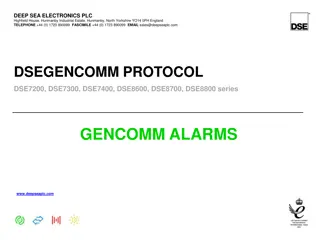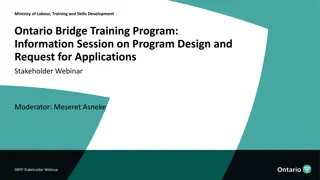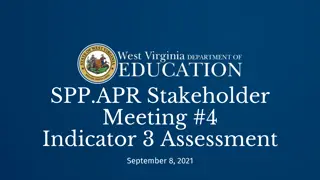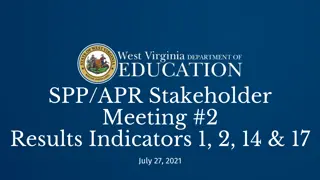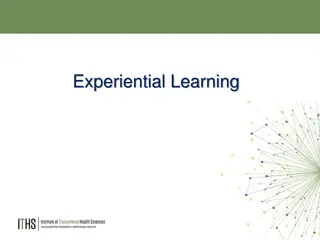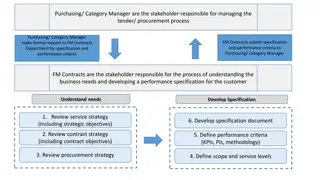GenComm Spring H2 Webinar Series on Stakeholder Engagement
The GenComm Spring Series of H2 webinars focuses on optimizing SMART H2 for a successful hydrogen Europe. Stakeholder engagement is highlighted as a key aspect to drive the energy transition and achieve net zero emissions by 2050. Explore insights from industry experts on enhancing stakeholder engagement, empowering H2 integration, and the role of hydrogen in European energy systems.
Download Presentation

Please find below an Image/Link to download the presentation.
The content on the website is provided AS IS for your information and personal use only. It may not be sold, licensed, or shared on other websites without obtaining consent from the author.If you encounter any issues during the download, it is possible that the publisher has removed the file from their server.
You are allowed to download the files provided on this website for personal or commercial use, subject to the condition that they are used lawfully. All files are the property of their respective owners.
The content on the website is provided AS IS for your information and personal use only. It may not be sold, licensed, or shared on other websites without obtaining consent from the author.
E N D
Presentation Transcript
GenComm Spring 21 Series of H Webinars SMARTH2 Webinar 5: H Stakeholder Engagement 27thMay 2021
GenComm Spring 21 Series of H Webinars - Webinar 5: H Stakeholder Engagement
WELCOME Hydrogen is the catalyst driving Europe s energy transition. Optimising this journey delivering SMARTH2 through valorization of the hydrogen supply chain, production, storage and use is key to creating a successful hydrogen Europe. The GenComm Spring Series of H2 webinars is focused on SMARTH2. Looking at how we can optimise GreenH2 to deliver increased benefits across the hydrogen value chain, accelerating cost reductions for hydrogen production, transmission, distribution, retail, and end applications. GenComm Spring 21 Series of H Webinars - Webinar 5: H Stakeholder Engagement
Agenda 10:00 - 10:10: Welcome & Introduction, Paul McCormack, Belfast Met & GenComm 10:10 - 10:30: Enhancing stakeholder engagement, Jan Hildebrand, IZES 10:30 - 10:50: Empowering H2 integration, Anne Toner, Hydrogen Ireland (H2Irl) 10:50 - 11:10: H2 in European Energy systems 2025+, Bart Biebuyck, The Fuel Cells and Hydrogen Joint Undertaking (FCH JU) 11:10 - 11:20: Q&A GenComm Spring 21 Series of H Webinars - Webinar 5: H Stakeholder Engagement
Spring 21 SMART H2 series The previous webinars all looked at different stages of the Hydrogen value chain. Today s webinar is focussed on the most important part, that of Stakeholder Engagement. Stakeholder Engagement Demand and Use Infrastructure & Storage Green H2 Supply Hydrogen Optimisation GenComm Spring 21 Series of H Webinars - Webinar 5: H Stakeholder Engagement
Net Zero by 2050 The energy sector is one of the leading sectors that must respond to the global climate challenge. On the 18th May the International Energy Agency announced their net zero by 2050 roadmap. The recently announced IEA roadmap is a viable pathway to building a global energy sector with net- zero greenhouse gas emissions in 2050. However it is a narrow route that needs widened by technology adaption and more importantly it needs populated. Stakeholder engagement is the key to the roadmap being successful, it requires immediate action from stakeholders across all countries to deliver a SMART H2 Highway - a transformation of our energy spectrum where all can participate and secure a just transition to net zero. https://www.iea.org/reports/net-zero-by-2050 GenComm Spring 21 Series of H Webinars - Webinar 5: H Stakeholder Engagement
SKILLS We must address the challenges workers face by ensuring that they have the appropriate skills and training to build back greener post COVID alongside long term plans for skills necessary to bet to a net zero economy. GenComm Spring 21 Series of H Webinars - Webinar 5: H Stakeholder Engagement
An energy sector dominated by renewables Instead of fossil fuels, the energy sector is based largely on renewable energy. Two-thirds of total energy supply in 2050 is from wind, solar, bioenergy, geothermal and hydro energy. Solar becomes the largest source, accounting for one-fifth of energy supplies. Solar PV capacity increases 20-fold between now and 2050, and wind power 11-fold. GenComm Spring 21 Series of H Webinars - Webinar 5: H Stakeholder Engagement
The transition to net zero is for and about people A transition of the scale and speed described by the net zero pathway cannot be achieved without sustained support and participation from citizens. GenComm Spring 21 Series of H Webinars - Webinar 5: H Stakeholder Engagement
Clean energy jobs will grow strongly but must be spread widely The transition to net zero brings substantial new opportunities for employment, with 14 million jobs created by 2030 in our pathway thanks to new activities and investment in clean energy. Spending on more efficient appliances, electric and fuel cell vehicles, and building retrofits and energy-efficient construction would require a further 16 million workers. GenComm Spring 21 Series of H Webinars - Webinar 5: H Stakeholder Engagement
Clean energy jobs will grow strongly but must be spread widely The transition to net zero brings substantial new opportunities for employment, with 14 million jobs created by 2030 in our pathway thanks to new activities and investment in clean energy. Spending on more efficient appliances, electric and fuel cell vehicles, and building retrofits and energy-efficient construction would require a further 16 million workers. GenComm Spring 21 Series of H Webinars - Webinar 5: H Stakeholder Engagement
Net zero by 2050 requires huge leaps in clean energy innovation Reaching net zero by 2050 requires further rapid deployment of available technologies as well as widespread use of technologies that are not on the market yet. Most of the global reductions in CO2emissions through 2030 in our pathway come from technologies readily available today. But in 2050, almost half the reductions come from technologies that are currently at the demonstration or prototype phase. In heavy industry and long-distance transport, the share of emissions reductions from technologies that are still under development today is even higher. GenComm Spring 21 Series of H Webinars - Webinar 5: H Stakeholder Engagement
Engagement We must accelerate the clean energy transition, promote a circular economic approach, transition to sustainable supply chains and mainstream renewables. Our transition to net zero will depend upon developing a skilled workforce necessary to deliver it, in a way that leaves no one behind. To achieve this we must build on the skills and knowledge in transition sectors specifically the built environment. We must develop new labour markets for decent work and quality green jobs as well as investing in pioneering digitalisation as a key delivery model. GenComm Spring 21 Series of H Webinars - Webinar 5: H Stakeholder Engagement
Net zero by 2050 requires huge leaps in clean energy innovation Reaching net zero by 2050 requires further rapid deployment of available technologies as well as widespread use of technologies that are not on the market yet. Most of the global reductions in CO2emissions through 2030 in our pathway come from technologies readily available today. But in 2050, almost half the reductions come from technologies that are currently at the demonstration or prototype phase. In heavy industry and long-distance transport, the share of emissions reductions from technologies that are still under development today is even higher. GenComm Spring 21 Series of H Webinars - Webinar 5: H Stakeholder Engagement
Q & A GenComm Spring 21 Series of H Webinars - Webinar 5: H Stakeholder Engagement
Social Distance Calling Card GenComm Website - nweurope.eu/gencomm LinkedIn - GenComm Twitter - @GenComm_CH2F Community Hydrogen Forum CH2F - communityh2.eu Hydrogen Ireland website - hydrogenireland.org GenComm Spring 21 Series of H Webinars - Webinar 5: H Stakeholder Engagement
